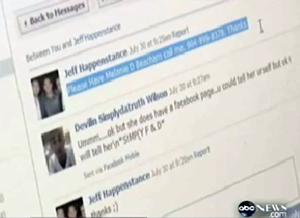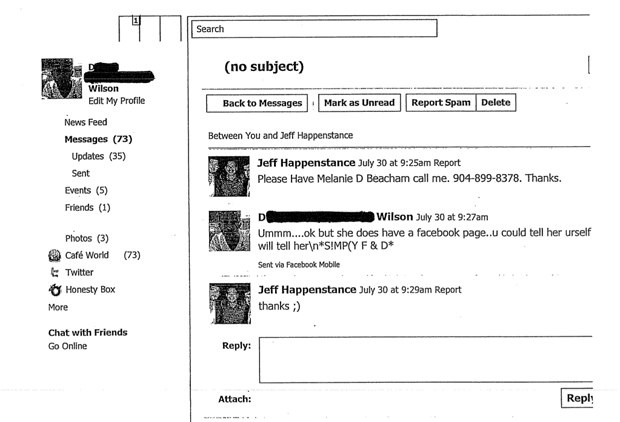 Getting tagged in a drunken photo is no longer the most embarrassing thing that can happen to you on Facebook. Earlier this year St. Petersberg resident Melanie Beacham fell $362 behind on her car payments. Her debt collection agency MarkOne Capital tried contacting her through the phone (up to 20 times per day) but then moved on to using Facebook to send bizarre messages to her friends and family.
Getting tagged in a drunken photo is no longer the most embarrassing thing that can happen to you on Facebook. Earlier this year St. Petersberg resident Melanie Beacham fell $362 behind on her car payments. Her debt collection agency MarkOne Capital tried contacting her through the phone (up to 20 times per day) but then moved on to using Facebook to send bizarre messages to her friends and family.
Feeling like something wasn’t right about being contacted through her social graph by the absurd user profile Jeff Happenstance (whose profile image now seems to be an ominous array of cars), Beacham went to Morgan and Morgan consumer protection attorney Billy Howard who then filed an unprecedented lawsuit against MarkOne Financial.
It turns out that contacting debtors through the social network is a big no no, at least in Facebook’s perspective. In a statement they gave to The Atlantic.
“There are state and federal laws and FTC regulations that govern the actions of debt collectors. The collector in the St. Petersburg case likely violates a number of these laws and regulations and we encourage the victim to contact the FTC and her state Attorney General.
In addition, Facebook policies prohibit any kind of threatening, intimidating, or hateful contact from one user to another. We encourage people to report such behavior to us, only accept friend requests from people that they know, and use privacy settings and our blocking feature to prevent unwanted contact.”
The FTC Fair Debt Collection Practices Act is currently in the process of being amended (it hasn’t been updated since 2006) and does not specifically deal with social networking. It does however protect against “contact by embarrassing media” and it remains to be seen whether Facebook messages will count.
The Beacham case will be the first time someone has sued a debt collector for their use of Facebook and the first time someone has put through a motion to enjoin the use of Facebook to contact a debtor’s family and friends. Howard says the danger with Facebook is that collectors can reach out a lot easier and reach a lot more people than a phone call.
Howard recommends that anyone who receives a Facebook message from a debt collector screen capture and save the messages as evidence, “Contacting family and friends through Facebook is 21st century buggery. Some of these tactics that debt collectors take, wouldn’t even know if John Gotti would have allowed them.”
Court documents below.
Image: Switched.
